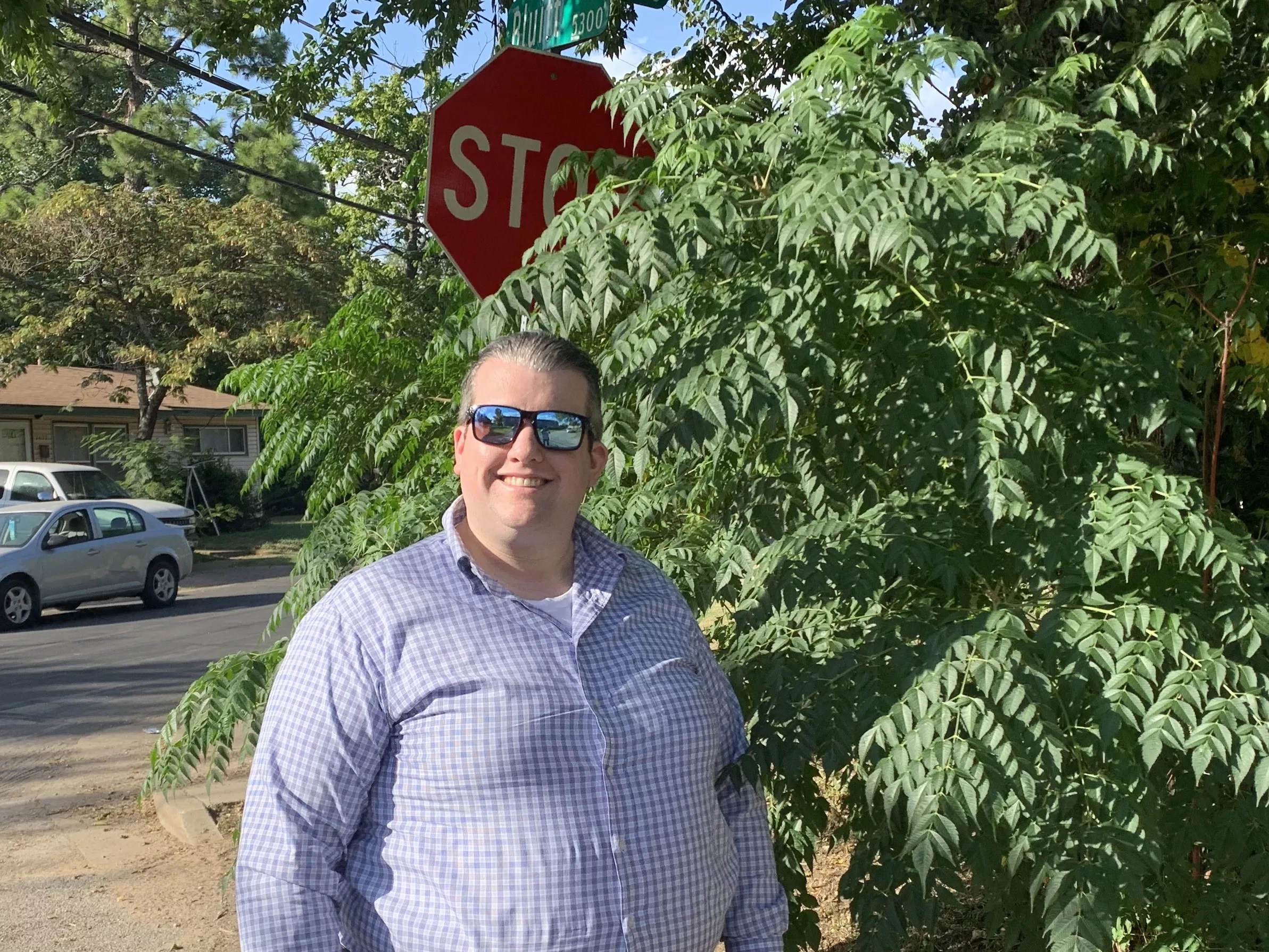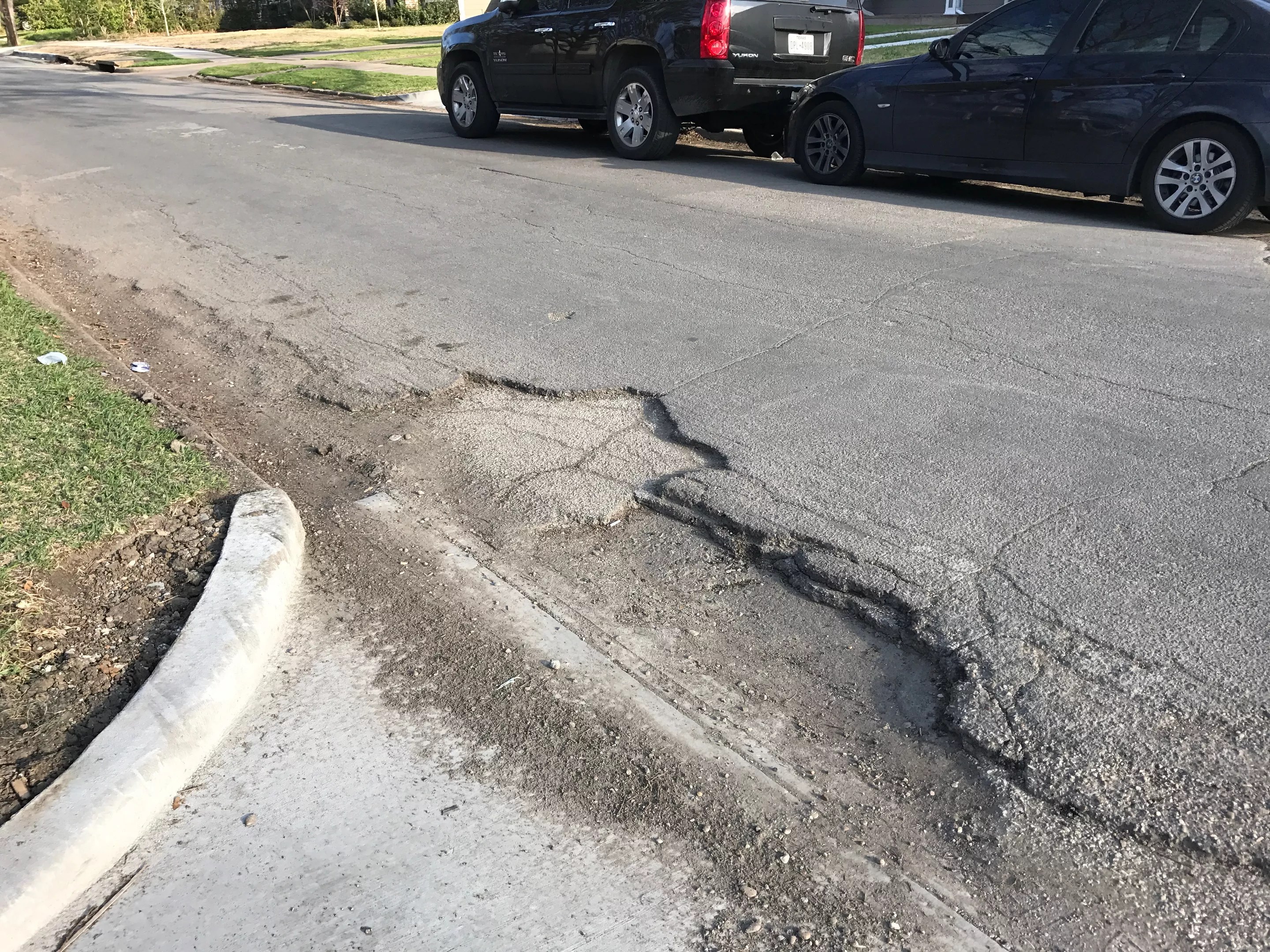
Emma Ruby

Audio By Carbonatix
Adam Sharkey sees things others don’t.
He notices the stop sign that tilted 10 degrees after the last rainstorm, when the soggy ground sagged under the metal pole. He notices the shrubbery that has grown over a speed limit posting, obscuring it from view. And he notices the potholes.
At a certain point, you can only see something wrong so many times before you take the situation into your own hands. Sharkey, 33, hit that point three months ago, when he drove up on a curb whose reflective paint had faded. It was late at night, and he ended up stranded in downtown Dallas with a flat tire.
Will you step up to support Dallas Observer this year?
At the Dallas Observer, we’re small and scrappy — and we make the most of every dollar from our supporters. Right now, we’re $14,000 away from reaching our December 31 goal of $30,000. If you’ve ever learned something new, stayed informed, or felt more connected because of the Dallas Observer, now’s the time to give back.
An Uber driver and a salesman who travels for appointments, Sharkey logs somewhere around a thousand miles a week on Dallas’ streets. His car being out of commission, all because of some faded paint, made him “so mad,” and Dallas seemed like the easy target to blame. He Googled the best way to give the city a piece of his mind, and the Dallas 311 app, on which citizens can request city services or report code violations to inspectors, came up. He filed a complaint that night.
Since then, he’s filed more than 500 complaints, snapping photos of inadequate signage and splitting pavement while out on sales calls or between Uber rides. He then submits the tickets through the 311 app while stopped at gas stations or when he gets home for the night.
“It’s gotten to the point where a couple of the leaders of the department have called me and said, ‘Are you just really pissed off about Dallas? Because we come in after the weekend and there are a hundred tickets from you,'” Sharkey said. “And it’s like, ‘Hey, I drove 600 miles this weekend for Uber. Don’t take it personally,’ I call them as I see them.”

Sharkey’s nominee for worst street in the city is the 2000 Block of Coombs Street, next to the Cedar Market Ranch, because of the old train tracks emerging from the asphalt.
Emma Ruby
Most of his service reports go to the transportation and public works department, which handles road conditions, and the code compliance department, which handles signage or dumping issues. He’s on a texting basis with some inspectors, who got so used to seeing his name pop up on the 311 app, they started reaching out to ask for clarification on unclear tickets.
Navigating the app has become “muscle memory” for Sharkey, who is especially impassioned about potholes – “public enemy No. 1,” he says – because they damaged his car’s front struts when he first arrived in Dallas seven years ago.
Not everyone shares Sharkey’s affinity for 311, though. According to The Dallas Morning News, a community survey conducted last year showed that the department’s satisfaction rate with residents hovered around 57%. There have been longstanding complaints about service requests being closed without resolution and language barriers prohibiting residents from reporting issues. Last year, the app relaunched with English and Spanish options.
But Sharkey believes that many of the frustrations directed at the 311 department can often be attributed to the understaffing and overworking of city inspectors, the people charged with answering service requests.
“Why do we have so many potholes? Because they don’t have the resources. But how do you get the resources if you don’t have the tickets to show a backlog?” Sharkey said. “So my goal is to overwhelm the heck out of [the 311] team with tickets. And then they’ll have the ammunition to say, ‘We need two more pothole guys,’ and actually go out there and address these concerns.”
Service Request Spotting
We rode along with Sharkey one afternoon earlier this week to hunt for code violations and shoddy streets.
We’d expected to see a handful of issues in the 90-minute drive. By the time our ride ended, we’d submitted 12 tickets for service requests, and that was with Sharkey declaring he’d be picky about what we stopped for.
Three tickets had already been resolved within 24 hours of our drive. “That’s not bad,” Sharkey said.
There were a few crooked signs and a few signs obstructed by vegetation. There was also a pothole shaped like a tooth cavity, and a pothole that looked like the first scoop taken out of a fresh container of ice cream. We then saw a tree with low-hanging branches spilling onto a sidewalk, prohibiting wheelchair users from making their way down the road.

Sharkey reported a faded stop sign near Fair Park, which he believes is at least two decades old because it does not comply with federal signage standards set in 2003.
Emma Ruby
He reported a faded, non-reflective stop sign that was at least two decades old. As soon as we turned a corner, Sharkey pointed out that it doesn’t comply with the federal standards for stop signs adopted through the Manual on Uniform Traffic Control Devices (MUTCD) in 2003. Meeting those signage standards is essential, he emphasized, because complying with MUTCD standards is a prerequisite for federal transportation funding.
“I’m not just going around looking for things to complain about,” he said. “This is all stuff that is worth caring about.”
On more than one occasion, he’s reported a pothole to 311 only for an inspector to arrive and realize the whole street needs to be repaved. That’s an especially satisfying note to see, he said.
According to Daisy Torres Fast, director of the 311 department, service request tickets are automatically filtered to the department that handles the corresponding issue.
“Put your inspector hat on once a quarter, help out. It’s better for everybody.” – Adam Sharkey
While the updated 311 app launched last year, some version of the service has been available since 2013. Still, Fast said there are “some misconceptions” across the city regarding how service requests are handled. Oftentimes, she sees neighbors rallying around the idea that if everyone reports an issue, it’ll get solved faster. Instead, she said the service flags repeat service requests and throws them out if a ticket is still open, making Sharkey’s strategy of throwing a wide net of single complaints more effective for departments.
“Mr. Sharkey is doing a great job,” Fast said, laughing a bit as she looked at a report on the seemingly never-ending slew of tickets he’s submitted. “He’s literally going around and identifying various locations, various issues, just kind of proactively submitting multiple [service requests] … which is supported by me, absolutely.”
All in on 311
When driving for Uber, it’s generally more lucrative to drive in areas with higher property taxes. Sharkey did that for a while, snapping pictures between rides and submitting service requests, before he started to feel guilty that “only the rich people were getting their potholes fixed.” So he began prioritizing drives through Dallas’ more underserved neighborhoods, hoping to spread the 311 love.
What he found were communities in dire need of care from the city.
Originally from New Jersey, Sharkey moved to Dallas with a “superficial understanding” of how racism and segregation were historically used by city planners throughout the South to divide cities. By paying attention to Dallas’ streets, he realized that history still affects the city today.
“The roads are atrocious around Fair Park, some of the worst in the city,” he said. “Some of these neighborhoods’ conditions are crap because of redlining, so we do need to invest to help catch them up to the other parts of the city.”

Sharkey declared war on Dallas’ potholes after seeing the bill to replace the front struts in his car, which were destroyed by the roads.
Paige Skinner
He’s not too shy to brag about what he’s gotten fixed around the city.
When driving for Uber, he likes to point out street corners where fresh pavement denotes a newly filled pothole. He also likes to direct his riders’ attention to a sparkly new sign planted after a storm knocked the last one over. More than a few times, his enthusiasm has spilled over, and his riders have stepped out of his 2024 Toyota Corolla with the Dallas 311 app freshly downloaded on their phones.
He acknowledges that there are some weird bugs in the app.
Some issues, like vegetation obstructing a sign, are deemed emergencies by the city, so when you start to fill out a service request, the app prompts you to call the 311 line instead. But that method means inspectors aren’t given a photo of the issue, which means more often than not, they aren’t going to be able to find it. As a workaround, Sharkey discovered that the “Other” option under signage issues allows a user to submit a photo and denote the vegetation overgrowth.
Hoping to share his passion for 311 with the world, Sharkey turned to the Dallas subreddit to start sharing his tips for navigating the app and his best finds from weeks prior. Then he decided to start a whole forum dedicated to Dallas 311. His first project, he said, will be compiling guides to the 311 services for cities across North Texas, so anyone who has a pothole they want to complain about can find a guide to getting it fixed.
As Sharkey finishes one last service request before our ride ends, he describes himself as a “pragmatic optimist.”
“I wouldn’t be doing this if I didn’t truly believe things can get better,” he said.
He does have one warning, however. Once you become aware of the 311 issues, you will never stop seeing them.
“If all the adults in Dallas downloaded the 311 app and just reported one thing per year, we could solve a million problems. How many potholes [could we fix]? How many signs, how many bulbs and street lamps, everything everybody complains about,” Sharkey said. “Put your inspector hat on once a quarter, help out. It’s better for everybody.”